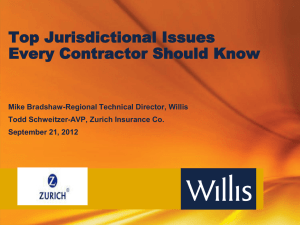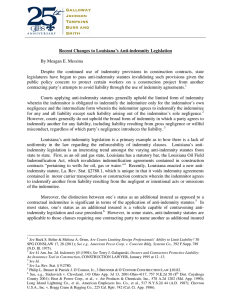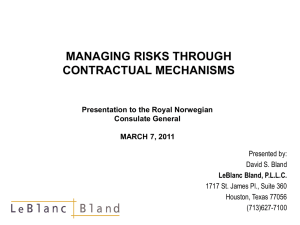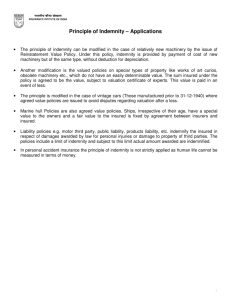how the texas anti-indemnity act affects risk transfer
advertisement
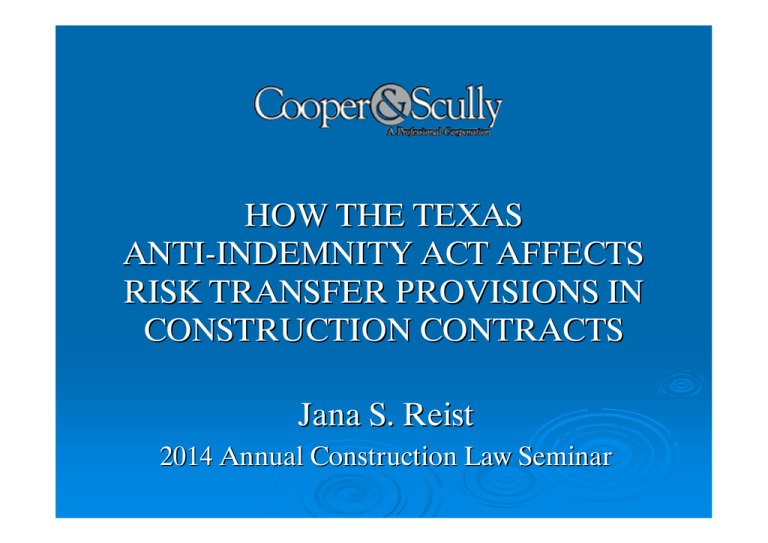
HOW THE TEXAS ANTI-INDEMNITY ACT AFFECTS RISK TRANSFER PROVISIONS IN CONSTRUCTION CONTRACTS Jana S. Reist 2014 Annual Construction Law Seminar RISK TRANSFER PROVISIONS IN CONSTRUCTION CONTRACTS Two Main Risk Transfer Provisions: 1. Contractual Indemnity Agreements 2. Additional Insured Provisions CONTRACTUAL INDEMNITY AGREEMENTS An indemnity agreement is a promise to safeguard or hold the indemnitee harmless against either existing and/or future loss, damage or injury liability CONTRACTUAL INDEMNITY AGREEMENTS Three main types : 1. 2. 3. Broad form indemnity – indemnitor assumes unqualified obligation to indemnify the indemnitee for any and all liability arising out of specified subject matter. Intermediate Form Indemnity – requires indemnitor to indemnify the indemnitee for any and all liability arising out of a specified subject matter, even if damage/injury is caused by the negligence of indemnitee, but specifically excludes the indemnitor’s sole negligence. Limited form Indemnity - Indemnitor is obligation to indemnify indemnitee only to the extent of the indemnitor’s fault. TEXAS INDEMNITY LAW PRIOR TO THE ANTI-INDEMNITY ACT In order to be enforceable, must meet the Fair Notice Doctrine 1. Express Negligence Test: 2. Conspicuousness Requirement: Dresser Industries, Inc. v. Page Petroleum, 853 S.W.2d 505 (Tex. 1993). “a provision is ordinarily conspicuous when a reasonable person against whom it is to operate ought to have noticed it.” Ethyl Corp. v. Daniel Construction Co., 725 S.W.2d 705 (Tex. 1987). A party seeking indemnity from the consequences of his/her own negligence must express that intent in specific terms TEXAS ANTI-INDEMNITY ACT – HOUSE BILL 2093 Prohibits and makes void broad form and intermediate form indemnity agreements (claims involving the sole or concurrent negligence of indemnitee) for construction projects, if the Act applies to your contract. Threshold question is whether the Act applies to the contract at issue. TEXAS ANTI-INDEMNITY ACT – HOUSE BILL 2093 Anti-Indemnity Act applies to a construction contract for a construction project for which an indemnitor is provided or procures insurance subject to Chapter 151 (a Consolidated Insurance Program) or Title 10 TEXAS ANTI-INDEMNITY ACT Texas Insurance Code Section 151.102 a provision in a construction contract, or in an agreement collateral to or affecting a construction contract, is void and unenforceable as against public policy to the extent that it requires an indemnitor to indemnify, hold harmless, or defend a party, including a third party, against a claim caused by the negligence or fault, the breach or violation of a statute, ordinance, governmental regulation, standard, or rule, or the breach of contract of the indemnitee, its agent or employee, or any third party under the control or supervision of the indemnitee, other than the indemnitor or its agent, employee, or subcontractor of any tier. TEXAS ANTI-INDEMNITY ACT What is a “Construction Contact”? It includes a contract, subcontract, agreement or performance bond: Made by or between an owner, architect, engineer, contractor, construction manager, subcontractor, supplier, or material or equipment lessor for the design, construction, alteration, renovation, remodeling, repair, or maintenance of a building, structure, appurtenance, or other improvement to or on public or private real property, including moving, demolition and excavation connected with the real property. TEXAS ANTI-INDEMNITY ACT The Act Could Apply to Contracts Not Typically Considered to be in the Construction Field Thompson v. Pizza Hut, No. 89-C-6496, 1992 WL 142318 (N.D. Ill. June 18, 1992) Found that a contract to computerize cash registers at Pizza Hut restaurants to be within the scope of the Illinois anti-indemnity act. Target Corp. v. All Jersey Janitorial Serv., No. 11-2429, 916 F.Supp.2d 909 (D. Minn. Jan. 7, 2013) Court found that “maintenance of real property” in the context of the statute did not cover a contract for housekeeping services. TEXAS ANTI-INDEMNITY ACT Exclusions from the Act The Act specifically does not cover agreements in which one party requires indemnity against another for the death or bodily injury of an employee of the indemnitor or its subcontractor TEXAS ANTI-INDEMNITY ACT Section 151.105 Contains 12 Exclusions: Consolidated insurance programs; Breach of contract or warranty actions; Loan and financing documents (other than construction contracts to which lenders are a party) General agreements of indemnity required by sureties Workers’ compensation benefits and protections Agreements subject to Chapter 127 of the Civil Practice & Remedies Code License or access agreements with railroad companies Indemnity provisions apply to copyright infringement claims; Construction contracts pertaining to single-family homes, townhouses and duplexes; Public works projects of municipalities Joint defense agreements entered into after a claim is made TEXAS ANTI-INDEMNITY ACT Exclusions from the Act Breach of Contract or Warranty Exception To be excluded, it must “exist independently of an indemnity obligation.” TEXAS ANTI-INDEMNITY ACT Exclusions from the Act Residential Construction Exception Construction contracts “pertaining to single-family homes, townhouses and duplexes” Are condominiums and apartments intended to included in this exclusion? • Legislative history suggest not covered under the exclusions. TEXAS ANTI-INDEMNITY ACT Exclusions from the Act Public Projects Exclusion This exclusions acknowledges and preserves governmental immunity protections. TEXAS ANTI-INDEMNITY ACT Effective Date Only applies to an original contract with an owner of an improvement or contemplated improvement that is entered into on or after the effective date of the act – January 1, 2012. TEXAS ANTI-INDEMNITY ACT Will the Fair Notice Doctrine die off? For the exceptions to the statute (i.e., residential contracts or claims involving employee injuries or death), that provision will need to satisfy the fair notice requirements. For general indemnity clause that complies with the indemnity statute: Can be argued that fair notice requirements would not apply since indemnitee is not seeking indemnification for its own negligence; However, Texas case law unclear and seems logical to assume that the intent of agreement should still be clear. ADDITIONAL INSURED PROVISIONS Requires a party to be added as an insured in the name insured’s liability policy, subject to the terms and conditions of the policy and the additional insured endorsement. Reinforce risk transfer that was sought after in the indemnity agreement. TEXAS ANTI-INDEMNITY ACT How Does it Affect Additional Insured Provisions? Any requirement in a construction contract for a party to name another as an AI under a policy of insurance with a scope of coverage that would cover the other party’s own negligent conduct would be void to the extent it required coverage for the other party’s own negligence. TEXAS ANTI-INDEMNITY ACT 151.104 (a) Except as provided by Subsection (b), a provision in a construction contract that requires the purchase of additional insured coverage, or any coverage endorsement, or provision within an insurance policy providing additional insured coverage, is void and unenforceable to the extent that it requires or provides coverage the scope of which is prohibited under this subchapter for an agreement to indemnify, hold harmless, or defend. TEXAS ANTI-INDEMNITY ACT What to Expect in the Future? Texas Department of Insurance has express authority under the Act to promulgate regulations to fill in any gaps in the Act. Courts will also be weighing in on the interpretation in the coming years. CERTIFICATES OF INSURANCE Senate Bill 425 (Chapter 1811 of Tex. Ins. Code) - applies to all COI issued on or after January 1, 2012 TDI must approve certificates of insurance in connection with casualty and property policies; A property or casualty insurer or agent may not issue a certificate of insurance or any other type of document purporting to be a certificate of insurance if the certificate or document alters, amends, or extends the coverage or terms and conditions provided by the insurance policy referenced on the certificate or document. Violation of law to ask for anything more than TDI approved certificate A person, including an insurer or agent, who willfully violates this chapter is subject to a civil penalty of not more than $1,000 for each violation. If you have any questions, contact: Jana S. Reist Jana.Reist@cooperscully.com 214.712.9571
